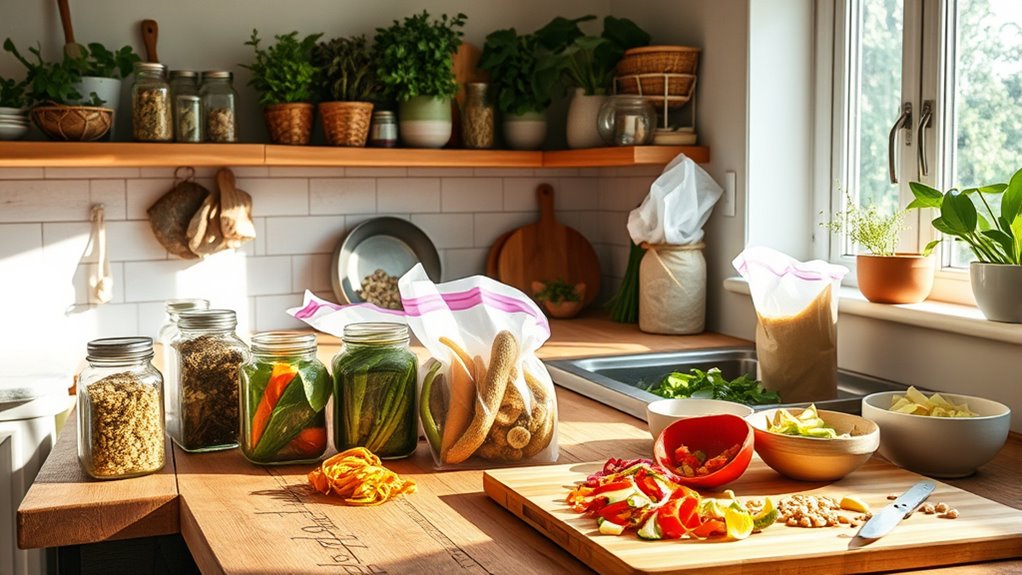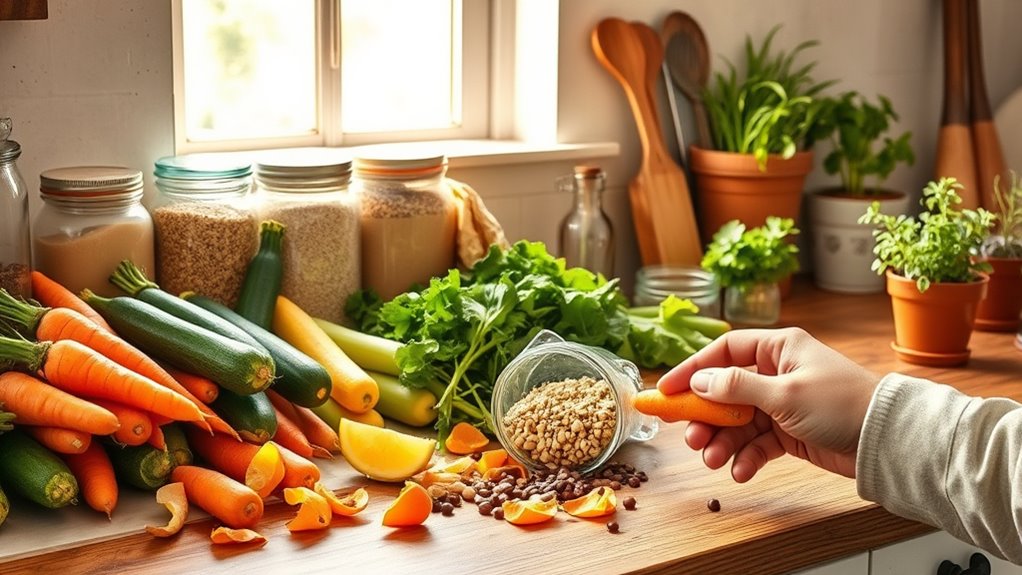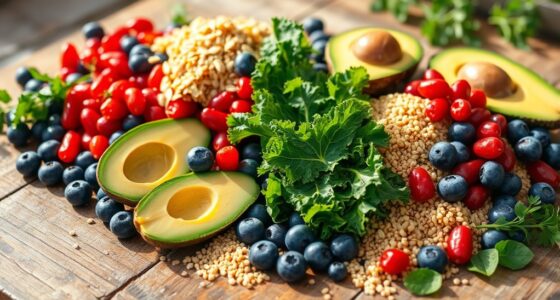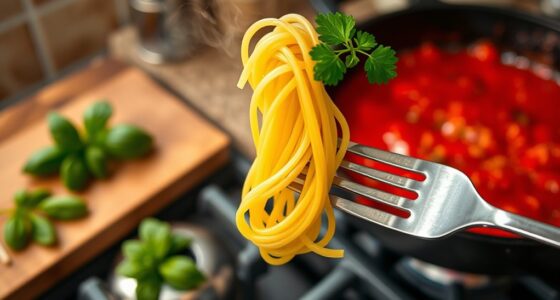Zero-waste cooking is gaining popularity as home cooks look for eco-friendly ways to reduce waste and support sustainability. You can join by choosing ethically sourced, seasonal ingredients, and buying locally to decrease transportation emissions. Compost kitchen scraps like vegetable peelings and eggshells to enrich your garden soil. Being mindful of portion sizes and minimizing packaging also makes a difference. Keep exploring to discover simple tips and tricks that help you fully embrace this environmentally conscious movement.
Key Takeaways
- Incorporate composting by collecting kitchen scraps like vegetable peelings and eggshells to reduce waste and enrich soil.
- Opt for sustainable ingredients such as seasonal, organic, and locally sourced foods to minimize environmental impact.
- Practice smarter purchasing by buying only what is needed, reducing excess and food waste.
- Support eco-friendly brands and responsible farming or fishing practices to promote sustainability.
- Improve kitchen efficiency with proper lighting and organization, enhancing the cooking experience while conserving energy.

Have you ever wondered how your everyday cooking habits can make a real difference for the environment? Moving toward zero-waste cooking isn’t just about reducing trash; it’s about making smarter choices that support sustainability and protect the planet. One of the easiest ways to do this is by incorporating sustainable ingredients into your meals. These are foods that are ethically sourced, locally produced, and have minimal environmental impact. Think seasonal vegetables, organic grains, and responsibly caught seafood. Using sustainable ingredients not only helps reduce your carbon footprint but also encourages you to buy smarter, less wasteful quantities. When you choose these items, you’re supporting farmers and companies committed to eco-friendly practices, which makes your cooking more aligned with environmental goals.
Alongside selecting sustainable ingredients, mastering composting tips can considerably reduce food waste. Composting is more straightforward than many believe, and it turns kitchen scraps into nutrient-rich soil for your garden. Start by collecting vegetable peelings, coffee grounds, eggshells, and fruit scraps—these are excellent compost ingredients. Avoid composting meat, dairy, or oily foods, as they can attract pests and create odors. Keep a small bin in your kitchen for these scraps, and regularly transfer the contents to your outdoor compost pile or bin. Covering compost with a layer of dry leaves or newspaper helps control moisture and odors, making the process more manageable. Composting not only minimizes waste but also enriches your garden soil naturally, closing the loop in your eco-conscious lifestyle. Additionally, understanding the importance of contrast ratio in your home kitchen setup can help you optimize lighting conditions for meal prep and food presentation, enhancing both functionality and aesthetics.
Frequently Asked Questions
How Can I Start Zero-Waste Cooking With Limited Budget?
To start zero-waste cooking on a budget, focus on sustainable shopping by buying in bulk and choosing local, seasonal produce. Use reusable bags and containers to avoid unnecessary packaging. Practice composting tips by composting veggie scraps and coffee grounds to reduce waste. Plan meals efficiently to minimize leftovers and waste. Small changes like these save money while helping you contribute to a more sustainable lifestyle.
What Are the Best Tools for Zero-Waste Meal Prep?
Think of your tools as the compass guiding your zero-waste journey. You’ll want reusable containers for sustainable packaging, beeswax wraps to replace plastic wrap, and glass jars for storage. A composting bin helps turn food scraps into nutrient-rich soil, closing the loop. Invest in quality knives and cutting boards to minimize waste during prep. These tools make your meal planning efficient and eco-friendly, turning waste into resources every step of the way.
How Do I Handle Food Waste in Small Kitchens?
In small kitchens, handle food waste by practicing composting tips like keeping a small bin nearby for scraps. Stay organized with your pantry to minimize excess, ensuring you use ingredients before they spoil. Regularly check for expired items and plan meals around leftovers. These habits reduce waste, save space, and make composting easier, helping you maintain an eco-friendly kitchen even in limited space.
Are Zero-Waste Cooking Techniques Suitable for Beginners?
Zero-waste cooking techniques are perfect for beginners because they’re simple, sustainable, and straightforward. You’ll find easy beginner methods like repurposing leftovers, composting scraps, and using versatile ingredients. These simple techniques help you reduce waste without feeling overwhelmed. With a little practice, you’ll master mindful methods that minimize waste, maximize flavor, and make cooking more conscious and creative. Zero-waste cooking is accessible and enjoyable for everyone starting out.
How Can I Involve My Family in Zero-Waste Practices?
You can involve your family in zero-waste practices by making it fun and educational. Encourage kids’ participation in shopping with reusable bags, sorting compost, and choosing waste-free recipes. Share your goals and progress, so everyone feels part of the journey. Turn waste-reduction into a family project, fostering teamwork and awareness. With your guidance, the whole family can embrace sustainable habits and enjoy making a positive impact together.
Conclusion
Remember, a journey of a thousand miles begins with a single step. By embracing zero-waste cooking, you’re not only reducing your environmental impact but also saving money and creating delicious, mindful meals. Every small effort counts, and together, we can make a big difference. So, don’t wait for perfect conditions—start today. As the saying goes, “Waste not, want not.” Join the movement and turn your kitchen into a force for positive change.










